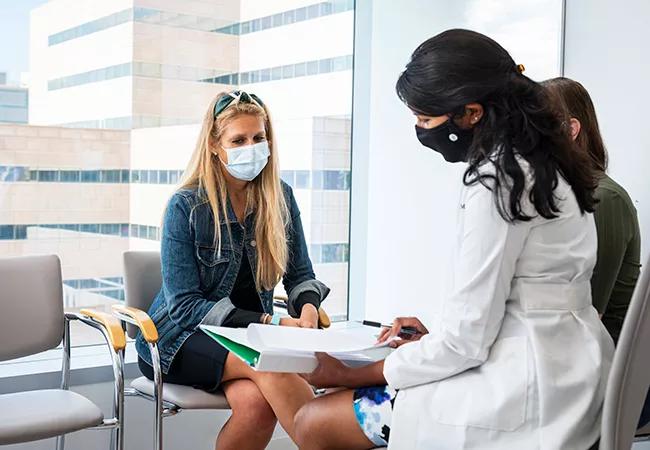Virtual clinic supports oncologists by educating patients and making treatment recommendations

Image content: This image is available to view online.
View image online (https://assets.clevelandclinic.org/transform/8743ea8a-148c-4533-915c-c209d23116f3/CNR-CQD-3-650x450-1_jpg)
CNR-Valleiano-2486367_Dr. Sadaps Genetics Research Meeting and P
The sequencing of the human genome has given rise to precision oncology, which offers tailored treatments to patients by targeting specific molecular alterations in their tumors. Next-generation sequencing (NGS) techniques can detect single or global genomic alterations both on germline and somatic DNA. While the evolution of NGS and subsequent novel targeted therapies offer promise, the complexity of data generated – including information on actionable mutations and associated therapies and clinical trials – can overwhelm patients and oncologists.
Advertisement
Cleveland Clinic is a non-profit academic medical center. Advertising on our site helps support our mission. We do not endorse non-Cleveland Clinic products or services. Policy
In October 2021, Cleveland Clinic launched a Genomics Clinic for patients with locally advanced and metastatic solid tumor malignancies to learn about NGS testing and the potential impact of their sequencing results.
“Cancer treatment is a rapidly expanding field, whether you’re talking about genomics, immunotherapy or cellular therapy. It’s a lot for even the most meticulous, well-read practitioners and their patients to keep up with,” says Pauline Funchain, MD, an oncologist and cancer genomics expert at Cleveland Clinic who co-founded the Genomics Clinic. “We hope to serve as a resource for primary oncologists, especially those who treat multiple histologies.”
The Genomics Clinic, which operates virtually on Tuesday and Wednesday mornings, is run by co-founder Meena Sadaps, MD, a Cleveland Clinic GI oncologist and cancer genomics expert. She partners with a genetic counselor to identify patients who should be referred for genetic testing and counseling, particularly those with pathologic alterations of high-variant allele frequencies suggestive of germline origin.
Education before and after NGS testing is a primary goal of the 30-minute appointments.
“Patients are often asked to submit saliva samples for partnered germline sequencing without properly understanding the rationale and the implications these results may carry,” explains Dr. Sadaps. During appointments, she discusses the difference between genetic and genomic testing, as well as what NGS testing entails and reveals.
Advertisement
If patients have already been tested, Dr. Sadaps performs a curated review of the results to determine what targeted on-label and off-label therapies and/or clinical trials they may be eligible for and from which they may obtain the highest clinical benefit.
The Genomics Clinic is also supported by Cleveland Clinic’s bimonthly Genomics Tumor Board. Potential off-label considerations and sequencing of therapies are discussed by the board, which includes medical oncologists, pathologists and genetic counselors. The board also reviews NGS results for any discrepancies that may require repeat testing or further evaluation.
“One of the benefits of the Genomics Tumor Board is that we have content experts – whether on the pathway, tumor type or both – who help us navigate the complexity of precision oncology in their respective histologies,” says Dr. Funchain.
Dr. Sadaps had virtual appointments with two patients soon after the Genomics Clinic was launched. Both had targetable mutations. One patient was eligible for two clinical trials being conducted at the University of Texas MD Anderson Cancer Center, where she will meet with oncologists to determine which to pursue.
“Getting NGS testing can open up doors for treatment in patients who might not otherwise have standard-of-care options, whether through clinical trials or off-label therapies,” says Dr. Sadaps.
Drs. Funchain and Sadaps co-authored a study published in 2018 in JCO® Precision Oncology on the therapeutic impact of precision oncology. In the retrospective review of 600 patients being treated for incurable solid tumor malignancies who underwent tumor genomic profiling, targeted therapies were recommended for 51.7% of cases. Tumor genomic profiling influenced the treatment of 15.8% of the patients in the study.
Advertisement
Dr. Sadaps encourages oncologists to consider NGS testing for patients early on in the course of their disease. The 2018 study showed that one of the main obstacles in patients receiving targeted therapies was that their performance status was often poor at the time results were obtained, making them ineligible for any potential clinical trials.
“If there are treatable mutations, we want to act on them, so early testing is critical,” explains Dr. Sadaps. “In parallel, we encourage clinicians to refer patients to us soon after their test results arrive so we can talk about options while patients are doing well clinically.”
Understanding all potential options is the goal.
“This is life or death for a lot of patients, so it’s comforting to know that you’ve covered all your bases. And as clinicians, we want our patients to have access to every possible treatment option,” says Dr. Funchain. “The Genomics Clinic provides a way for both patients and practitioners to feel like they have the most up-to-date information and opinions in the field of genomics-driven therapy.”
Advertisement
Advertisement
First-of-its-kind research investigates the viability of standard screening to reduce the burden of late-stage cancer diagnoses
Global R&D efforts expanding first-line and relapse therapy options for patients
Study demonstrates ability to reduce patients’ reliance on phlebotomies to stabilize hematocrit levels
A case study on the value of access to novel therapies through clinical trials
Findings highlight an association between obesity and an increased incidence of moderate-severe disease
Cleveland Clinic Cancer Institute takes multi-faceted approach to increasing clinical trial access 23456
Key learnings from DESTINY trials
Overall survival in patients treated since 2008 is nearly 20% higher than in earlier patients